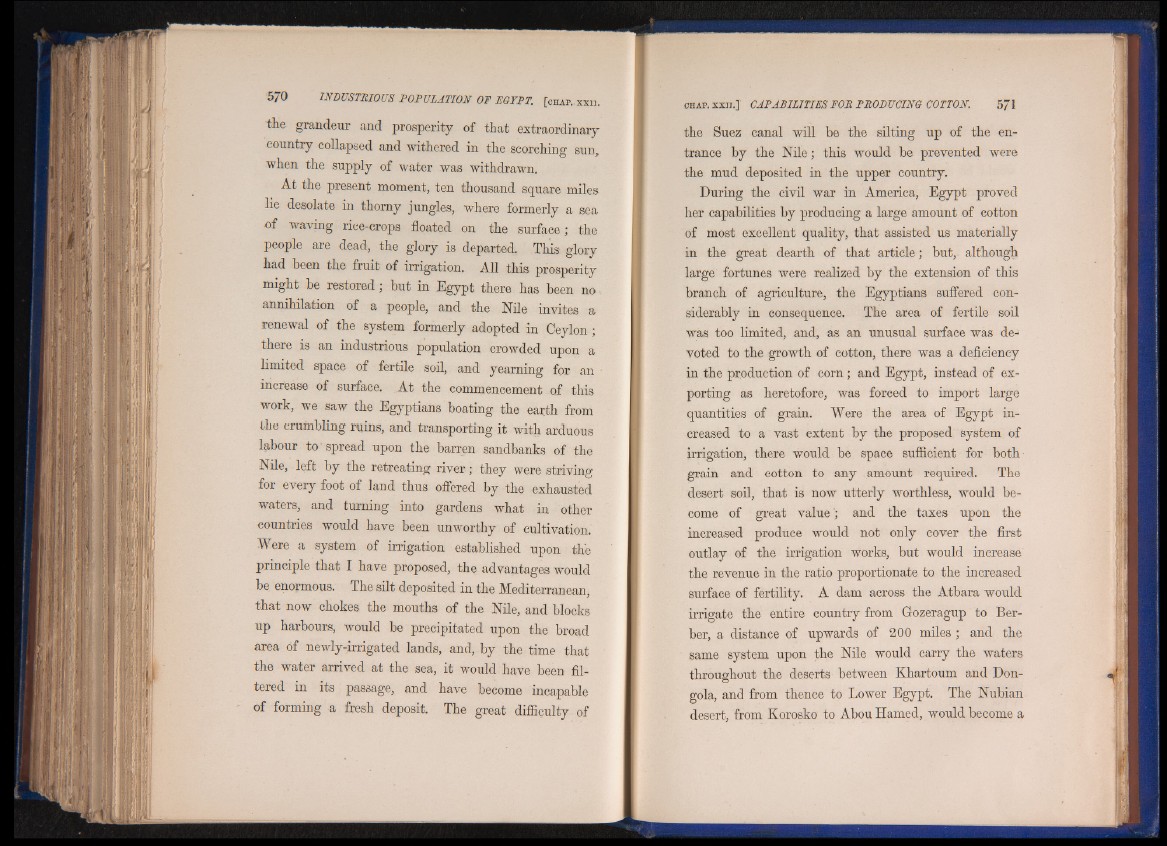
the grandeur and prosperity of that extraordinary
country collapsed and withered in the scorching sun,
when the supply of water was withdrawn.
At the present moment, ten thousand square miles
lie desolate in thorny jungles, where formerly a sea
of waving rice-crops floated on the surface; the
people are dead, the glory is departed. This glory
had been the fruit of irrigation. All this prosperity
might be restored; but in Egypt there has been no
annihilation of a people, and the Nile invites a
renewal of the system formerly adopted in Ceylon;
there is an industrious population crowded upon a
limited space of fertile soil, and yearning for an
increase of surface. At the commencement of this
work, we saw the Egyptians boating the earth from
the crumbling ruins, and transporting it with arduous
labour to 'spread upon the barren sandbanks of the
Nile, left by the retreating river; they were striving
for every foot of land thus offered by the exhausted
waters, and turning into gardens what in other
countries would have been unworthy of cultivation.
Were a system of irrigation established upon the
principle that I have proposed, the advantages would
be enormous. The silt deposited in the Mediterranean,
that now chokes the mouths of the Nile, and blocks
up harbours, would be precipitated upon the broad
area of newly-irrigated lands, and, by the time that
the water arrived at the sea, it would have been filtered
in its passage, and have become incapable
of forming a fresh deposit. The great difficulty of
the Suez canal will be the silting up of the entrance
by the Nile; this would be prevented were
the mud deposited in the upper country.
During the civil war in America, Egypt proved
her capabilities by producing a large amount of cotton
of most excellent quality, that assisted us materially
in the great dearth of that article; but, although
large fortunes were realized by the extension of this
branch of agriculture, the Egyptians suffered considerably
in consequence. The area of fertile soil
was too limited, and, as an unusual surface was devoted
to the growth of cotton, there was a deficiency
in the production of corn ; and Egypt, instead of exporting
as heretofore, was forced to import large
quantities of grain. Were the area of Egypt increased
to a vast extent by the proposed system of
irrigation, there would be space sufficient for both
grain and cotton to any amount required. The
desert soil, that is now utterly worthless, would become
of great v a l u e a n d the taxes upon the
increased produce would not only cover the first
outlay of the irrigation works, but would increase
the revenue in the ratio proportionate to the increased
surface of fertility. A dam across the Atbara would
irrigate the entire country from Gozeragup to Berber,
a distance of upwards of 200 miles ; and the
same system upon the Nile would carry the waters
throughout the deserts between Khartoum and Don- ^
gola, and from thence to Lower Egypt. The Nubian
desert, from Korosko to Abou Hamed, would become a